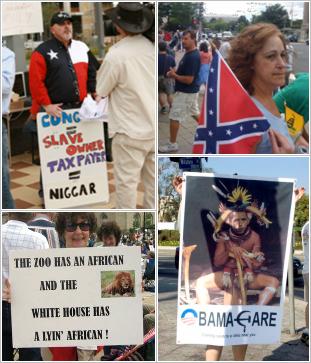Are Tea Partiers Racist?
By Arian Campo-Flores
Surveyers asked respondents in California and a half dozen battleground states (like Michigan and Ohio) a series of questions that political scientists typically use to measure racial hostility. On each one, Tea Party backers expressed more resentment than the rest of the population, even when controlling for partisanship and ideology. When read the statement that "if blacks would only try harder, they could be just as well off as whites," 73 percent of the movement's supporters agreed, while only 33 percent of people who disapproved of the Tea Party agreed. Asked if blacks should work their way up "without special favors," as the Irish, Italians, and other groups did, 88 percent of supporters agreed, compared to 56 percent of opponents. The study revealed that Tea Party enthusiasts were also more likely to have negative opinions of Latinos and immigrants.
These results are bolstered by a recent New York Times/CBS News surveyfinding that white Tea Party supporters were more likely to believe that "the Obama administration favors blacks over whites" and that "too much has been made of the problems facing black people." The survey also showed that Tea Party sympathizers are whiter, older, wealthier, and more well-educated than the average American. They're "just as likely to be employed, and more likely to describe their economic situation as very or fairly good," according to a summary of the poll.
If Tea Party supporters are doing relatively fine, what are they so riled up about? These studies suggest that, at least in part, it's race. The country that the Tea Partiers grew up in is irrevocably changing. Last month, new demographic data showed that minority births are on the verge of outpacing white births. By 2050, Hispanics are expected to account for more than a quarter of the American population. The Tea Partiers "feel a loss … like their status has been diminished," says David Bositis of the Joint Center for Political and Economic Studies, which examines issues of race. "If you listen to [their] language, it's always about 'taking our country back.' But it's really not taking the country back as is. It's taking the country back"—as in time.
Bositis finds the movement's arguments about reckless federal spending unpersuasive. Why, he asks, weren't they up in arms when President George W. Bush launched two costly wars and created a new unfunded mandate with his Medicare prescription-drug plan? Why didn't they take to the streets when he converted a surplus into a massive deficit? "I don't like to be in a position where I'm characterizing people as being racially biased," says Bositis. "But when the shoe fits, what do you do?" Given modern societal norms, "they know they can't use any overtly racist language," he contends. "So they use coded language"—questioning the patriotism of the president or complaining about "socialist" schemes to redistribute wealth.


No comments:
New comments are not allowed.